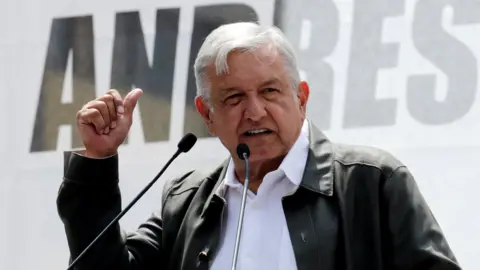Mexico's López Obrador pledges 'radical' change
 Reuters
ReutersLeft-wing politician Andrés Manuel López Obrador, who has been sworn in as Mexico's new president, has promised to bring radical change to his violence-plagued nation by eradicating corruption and ending drugs wars.
"We're not planning to create a dictatorship, neither open nor disguised," Mr López Obrador said in his victory speech after winning the presidency on his third attempt on 1 July.
"The changes will be profound, but these will be carried out with strict respect for the established legal framework."
The 65-year-old, who is popularly known as AMLO after the initials of his full name, likes to cast the challenge facing him in historical terms.
He sees his task as engineering a "fourth transformation" in Mexico's history, following its 1810 independence, the 1854-1857 liberalising reforms implemented by then-President Benito Juárez, and the wars of the 1910-1920 Revolution that forged the modern Mexican nation.
"We will carry out a peaceful transformation, ordered, but profound and even radical," Mr López Obrador has said.
On security
With the country's soaring murder rate set to reach a new annual record of 29,000 in 2018, much attention has been focused on Mr López Obrador's plans to pacify the violence inflicted by Mexico's feared drug cartels, whose feuds claim daily victims.
During his campaign, the leftist politician sharply criticised the military-led strategies practised since 2006 by both of his predecessors, presidents Felipe Calderón and Enrique Peña Nieto, in the so-called "war on drugs".
After initial promises to remove soldiers from the streets, Mr López Obrador announced on 14 November that he too would initially rely on the armed forces to fight crime, despite appeals from human rights groups to send the troops back to the barracks and develop professional police forces.
"We analysed the problem, we only have 40,000 federal police officers," he said.
"On the other hand, we had the option of seeking the support, the backing of the armed forces. We had those two options, and in politics you always have to choose between inconvenient options, and we decided to rely on the armed forces."
He also cited high levels of corruption within the civilian federal, state and municipal police forces, which he said lacked proper training.
However, he announced the creation of a new military-led law enforcement agency to be called the National Guard. He said his crime-fighting plan would also include social programmes such as offering scholarships for young people.
"This is a plan that is based on the criteria that we have maintained for many years ... peace and tranquillity are fruits of justice. Evil needs to be fought with good by addressing the roots that generate violence, this is why our main purpose to guarantee peace and tranquillity will be to improve living and working conditions among our people," he said.
The economy
Mr López Obrador's economic policy statements have caused some unease among investors and markets.
His 29 October announcement cancelling a multi-billion dollar project to build a new Mexico City airport, following the decision of a "people's consultation" referendum, rattled markets and caused a sharp drop in Mexico's stocks, bonds and currency.
He went on to announce that his administration would base many decisions on "consulting the people of Mexico".
Jitters in the business community increased after Mr López Obrador's ruling National Regeneration Movement Party (Morena) and the allied Labour Party (PT) recently presented legislative initiatives in Congress that would eliminate certain bank fees and commissions and private retirement fund administrators.
While insisting that he would check existing oil contracts for "corruption", he has nevertheless also moved to reassure investors, for example saying on 28 November that his government would not carry out "expropriations".
"The autonomy of the Central Bank of Mexico (Banxico) will be respected [by the presidency]; we won't spend more than what the government gathers from tax collection and a lot of confidence will be provided for the investors," he said.
Migrant crisis
Mr López Obrador's administration inherits a crisis caused by a recent surge of migrant caravans of mostly Central American nationals, fleeing poverty and violence in their home nations and flooding into Mexico to try to reach the US.
To try to curb these migrant flows, Mr López Obrador has proposed an ambitious co-operation scheme involving Mexico, Canada, and the US that would pump aid and investment into Central America to create jobs and raise living standards.
"This would lead us to jointly elaborate, finance and implement an integral development scheme [to deter migration]," he said in a joint news conference with his Guatemalan counterpart, Jimmy Morales, on 28 August.
Relations with Trump
Despite early predictions of a bruising ideological clash with his right-wing northern neighbour, US President Donald Trump, Mr López Obrador has - since his election - mostly argued that Mr Trump has maintained an attitude of "respect" towards him and Mexicans in general.
"I have spoken on two occasions with Trump [since the presidential election] and he has sent a delegation [to Mexico] and there are ongoing negotiations, and I must recognise that he has given us respectful treatment. You will see how we will maintain a good relationship with the US government," he said in a recent press conference.
Mr Trump has also said his administration would maintain a "very good relationship" with the López Obrador government.
Both leaders have avoided openly discussing controversial topics such as the Trump-proposed construction of a wall at the US-Mexico border, which the US leader had previously said Mexico would pay for in "one way or another".
